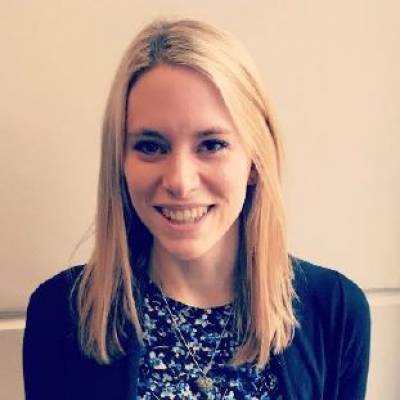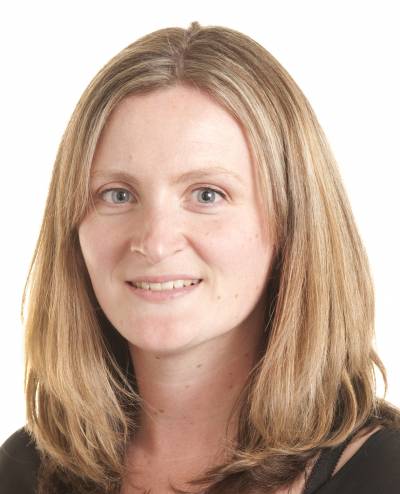Below are a few case studies of how the Institute has benefited, supported and developed various members of staff throughout their careers whilst at UCL.
Dr Sammy Quaife

Dr Sammy Quaife is a Cancer Research UK Postdoctoral Fellow in Behavioural Science whose career progression has benefited from the Institute's programme of training and support for early career researchers.
I joined the Department of Epidemiology and Public Health as a Research Assistant in August 2012 working with Professor Jane Wardle in the Health Behaviour Research Centre (now the Department of Behavioural Science and Health). I received strong senior mentorship and was inspired by Prof Wardle and many other leading female academics in our group. The culture was immediately inclusive. I was integrated within research meetings, always asked for my opinion and offered lots of opportunities to strengthen my skills. All the senior staff in our Department operated an open-door policy and were easy to approach, responsive and encouraging. With Prof Wardle's support and encouragement, I was subsequently awarded a Medical Research Council studentship to undertake my PhD.
I was mentored during my PhD as part of the Institute's mentoring scheme. We met up regularly, but informally, to discuss the non-academic aspects of PhD life, often with peers. This gave me the opportunity to voice any concerns and build networks with PhD students within the wider Institute. I really valued the support and reassurance.
During my PhD I was also helped with building research collaborations outside of our university, which have opened doors to opportunities for funding and multidisciplinary research studies. I benefited from the series of seminars and workshops provided by the Institute's Early Careers Forum, which helped me learn valuable skills in building networks, presenting work at conferences in a way that has impact and understanding how to develop in my research career.
Since my PhD, I have gone on to secure my first project grant (as Co-PI) as well as a Cancer Research UK Population Research Postdoctoral Fellowship (as PI). These are important next steps in my career which would not have been possible without support and mentorship, particularly from Prof Waller and Prof Janes, including mock fellowship interviews to help me prepare for this process. Of equal importance, this has provided me with stable employment for three years which will allow me to focus efforts on my research output and provide greater stability to support aspects of my personal life. Furthermore, at my last appraisal held during the Institute's new appraisal season, my manager and I put in place objectives to stretch and achieve further career progression.
To develop my managerial and leadership abilities as a female early career researcher, I have been supported by the Institute to attend courses on leadership aimed at early career researchers ('Leadership in Action'), a PhD supervision course and a grant funding 'sandpit' from which I was awarded an International Innovation Award with new Co-Investigators in Oklahoma and Glasgow. I have also attended a 'Where do you draw the line?' workshop which were extremely reassuring to me with regards to the Institute's commitment to addressing bullying and harassment. I have become a Line Manager and benefitted from the unconscious bias training programme which I completed prior to recruitment to ensure the process was as fair as possible for candidates.
Mrs Orla O'Donnell

Orla O'Donnell has benefited from IEHC career development support. She currently holds a PS Leadership role.
I started working as a full time Project Coordinator (Grade 6) at PCPH in 2006. During my appraisal I was set stretching objectives and encouraged to take on more responsibility to further my skills and experience, and was put forward for an accelerated increment and then secured promotion to Project Coordinator (Grade 7) in 2007.
In 2011 I fell pregnant with my first daughter and took 11 months maternity leave. I had my second daughter just 16.5 months later, so I returned to work pregnant. On my return I joined the Parents And Carers Together (PACT) Network which had been promoted throughout the department and benefit from their support, and the childcare vouchers scheme.
After my second maternity leave, supported by IEHC family friendly policies around flexible working, and work life balance, I changed by working hours to enable me to work 4 days a week to help balance work and childcare. Following advice at the Faculty and Institute Careers Surgery, I secured a role as a project manager for a newly formed social enterprise to roll out an eHealth Unit digital Diabetes intervention across the NHS. In September 2015 my eldest daughter started school and I then changed my hours to work 80% over 5 days so I was able to collect her from school.
I found out about the UCL Coaching and Mentoring Scheme from the IEHC staff handbook. With coaching support (soon after both girls were settled into school) I secured a secondment position within IEHC as the Site Manager and Institute Finance lead, and worked full time for 9 months in a role that offered me development opportunities and enable me to experience working at a higher level. After securing the position on a permanent basis this year, I am working flexi-time to allow me to continue to collect my daughters from school on a Monday. I also work from home occasionally and encourage colleagues to do the same to maintain a flexible, healthy work-life balance. I've found the Institute and Faculty Networks a great source of support and have been co-leading the Finance Network. We have matched mentors and mentees and support each other through changes at UCL.
Due to the encouragement and support that I've received, I have worked my way up through 3 UCL salary grades to Grade 8, and have again been put forward for an accelerated increment. I now actively support several junior professional services staff in developing their career pathways. The IEHC Guidance for Managers and Supervisors is also very helpful in supporting my role as line manager. This year 3 members of staff who I line manage have secured secondment positions, one has left UCL to secure a higher position at LSHTM, and we are putting in 4 applications for accelerated increments. This year I have been nominated for the UCL Women In Leadership programme.
 Close
Close

